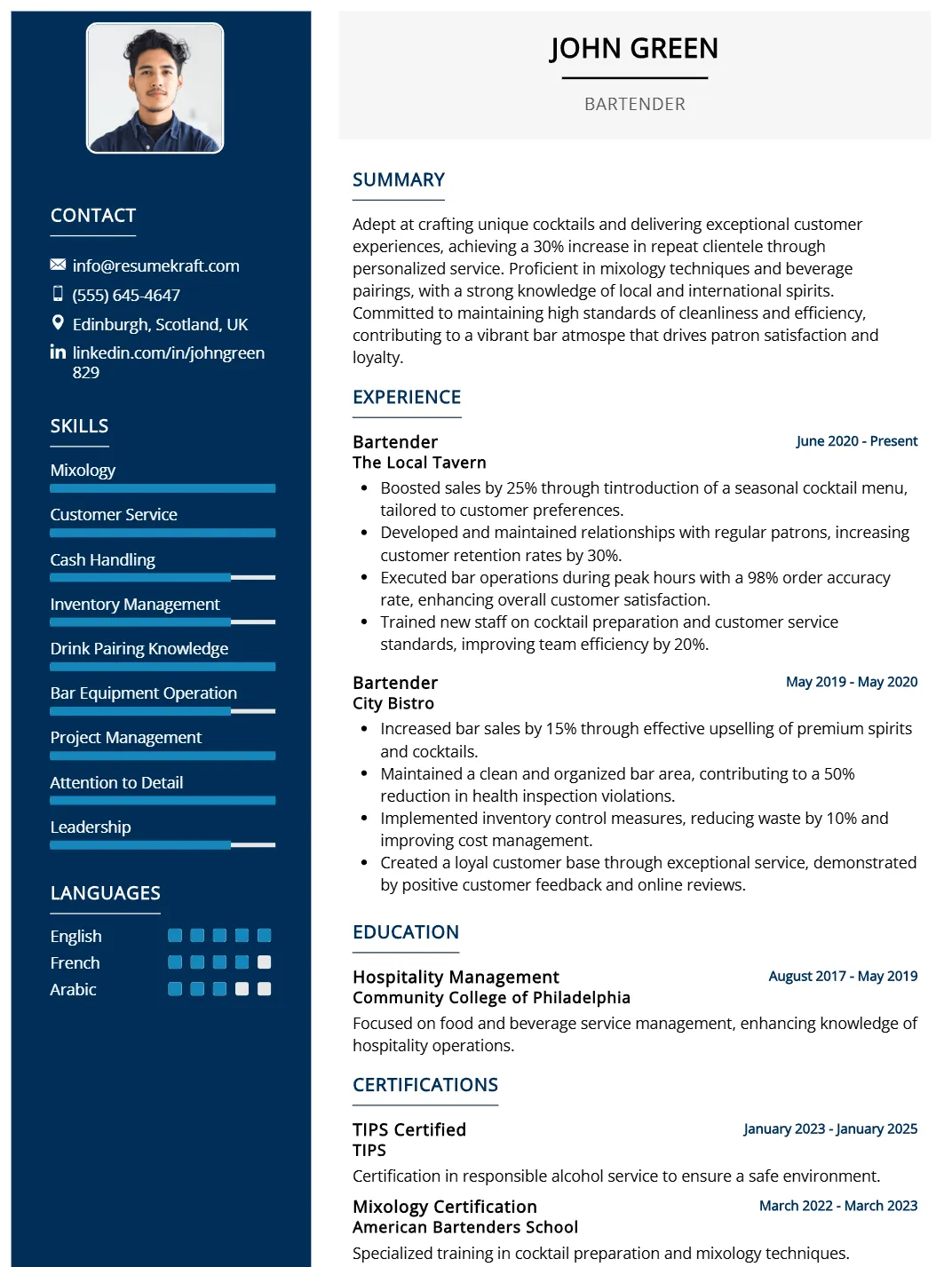
The role of a bartender is not just about mixing drinks; it encompasses a blend of creativity, customer service, and a deep understanding of various beverages. Bartenders create memorable experiences by crafting unique cocktails, providing excellent service, and fostering social interactions in bars and restaurants. In today’s job market, skilled bartenders are in high demand, as the hospitality industry continues to thrive. This article will guide you through writing an effective resume tailored specifically for bartenders, highlighting key skills, experiences, and tips to stand out in this competitive field.
- Bartender resume examples
- How to format a Bartender resume
- How to write your Bartender resume experience
- How to list your hard skills and soft skills on your resume
- How to list your certifications and education on your resume
- How to write your Bartender resume summary or objective
- Additional sections for a Bartender resume
- Key takeaways for writing a professional Bartender resume
- Frequently Asked Questions
Bartender resume examples
Bartender resume examples serve as valuable resources for job seekers aiming to showcase their skills and experiences in the hospitality industry. By examining these examples, candidates can gain insights into effective resume formatting, highlight relevant skills, and demonstrate their ability to create memorable customer experiences. Ultimately, these examples guide applicants in crafting resumes that stand out to potential employers in a competitive job market.
Bartender Resume

Why This Resume Works
This resume is effective for a Bartender position due to its clear emphasis on relevant skills like mixology and customer service, showcasing six years of direct experience in the role. The structured format highlights key competencies, ensuring easy readability for hiring managers and ATS systems alike. Additionally, it strategically presents achievements related to cash handling and inventory management, demonstrating reliability and efficiency—qualities essential in this industry. Overall, this resume effectively aligns with the expectations of potential employers in the bartending field.
Mixology Bartender Resume
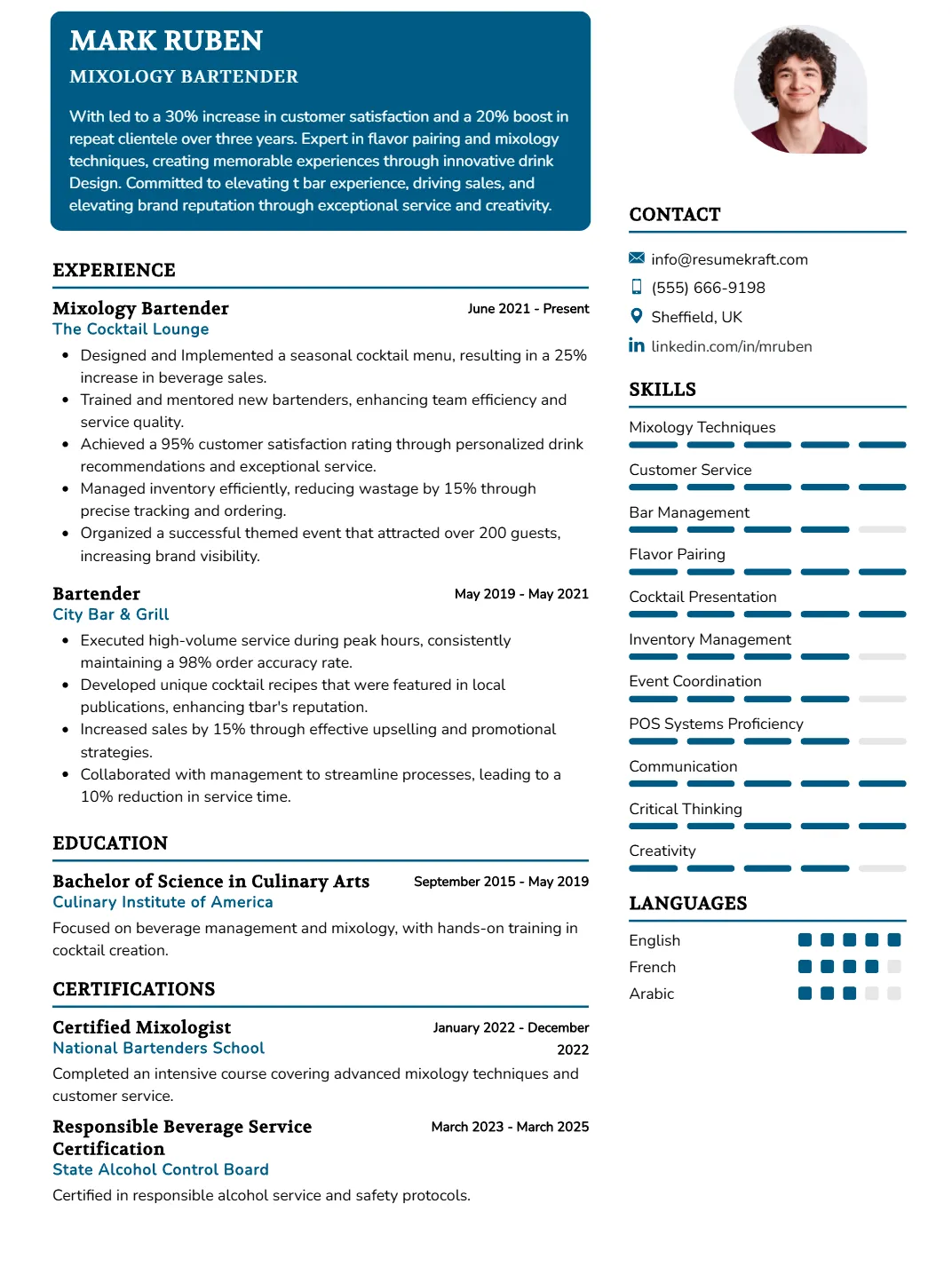
Why This Resume Works
This resume effectively showcases the candidate’s suitability for a Mixology Bartender position through targeted skills like mixology techniques and cocktail presentation. With six years of relevant experience, it highlights both practical expertise and customer service excellence, essential in this field. The clear format enhances readability, making key qualifications easily accessible to hiring managers. Furthermore, the use of industry-specific keywords supports ATS compatibility, ensuring optimal visibility. Strategic emphasis on achievements related to flavor pairing and bar management further distinguishes this candidate in a competitive market.
Nightclub Bartender Resume
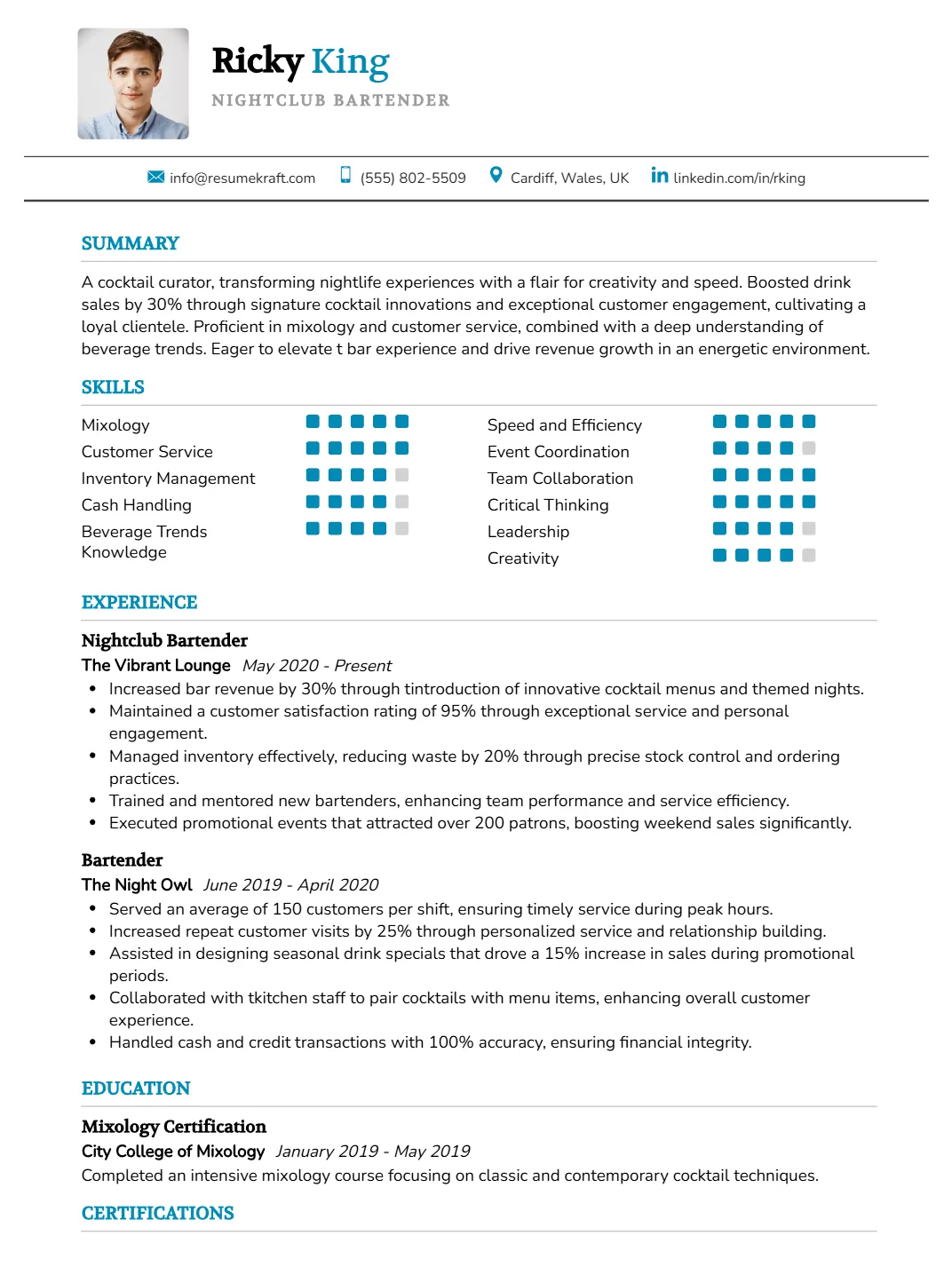
Why This Resume Works
This resume effectively highlights the candidate’s six years of experience as a Nightclub Bartender, showcasing key skills such as mixology, customer service, and cash handling. Its structured format clearly presents relevant achievements, emphasizing proficiency in inventory management and awareness of beverage trends—crucial for nightclub environments. The strategic use of industry-specific keywords enhances ATS compatibility, ensuring visibility to hiring managers. Overall, this focused approach aligns perfectly with the demands of a Nightclub Bartender position, making the candidate stand out.
Banquet Bartender Resume
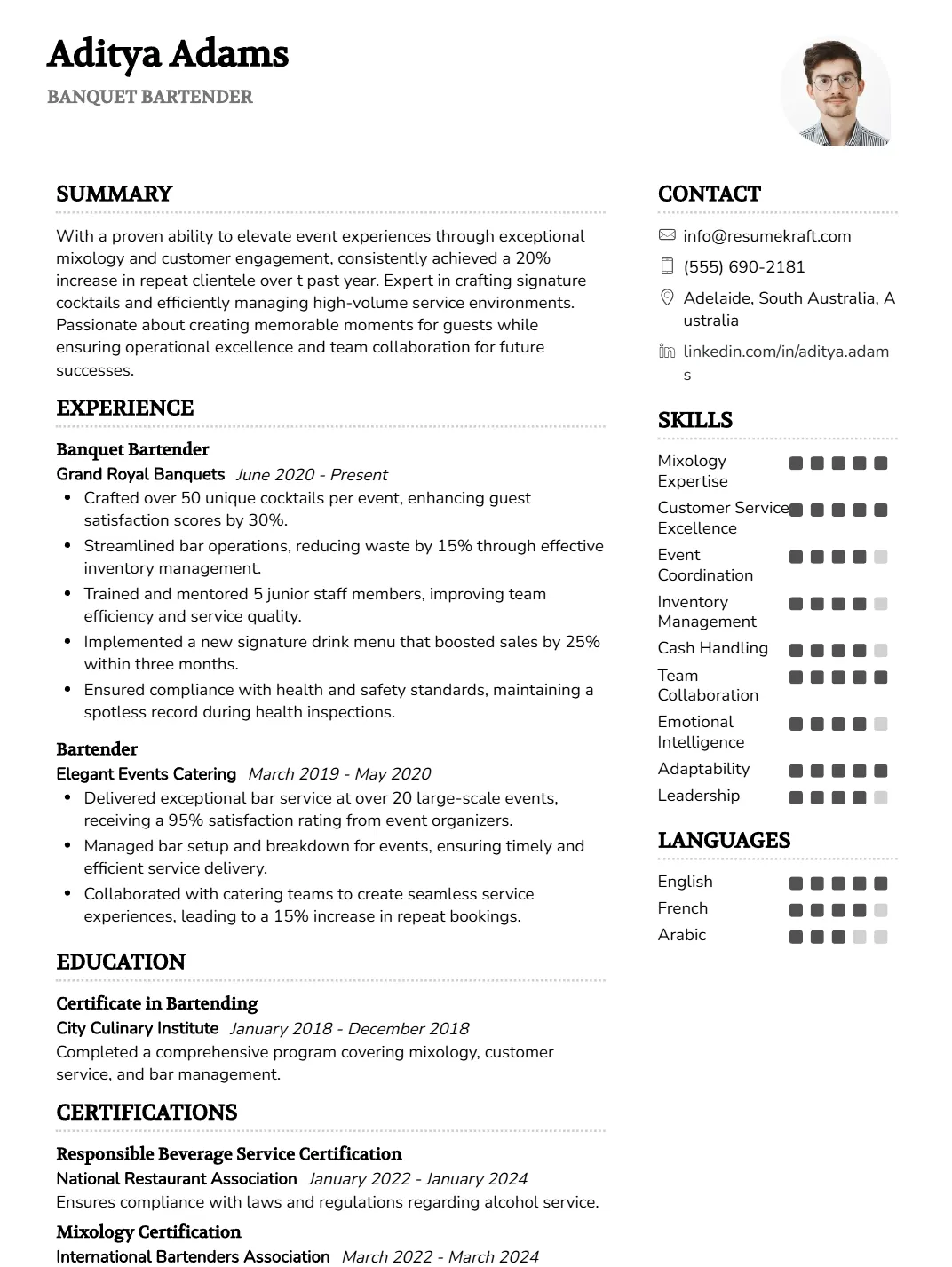
Why This Resume Works
This resume effectively showcases the candidate’s suitability for a Banquet Bartender position through targeted skills like mixology expertise and customer service excellence. The structured format highlights relevant experience, specifically six years in bartending, which enhances credibility. Its concise presentation aligns with industry preferences while ensuring ATS compatibility by incorporating key terms such as inventory management and cash handling. Additionally, strategic emphasis on achievements related to event coordination underscores the candidate’s ability to thrive in high-pressure banquet settings, making it a standout application.
Flair Bartender Resume
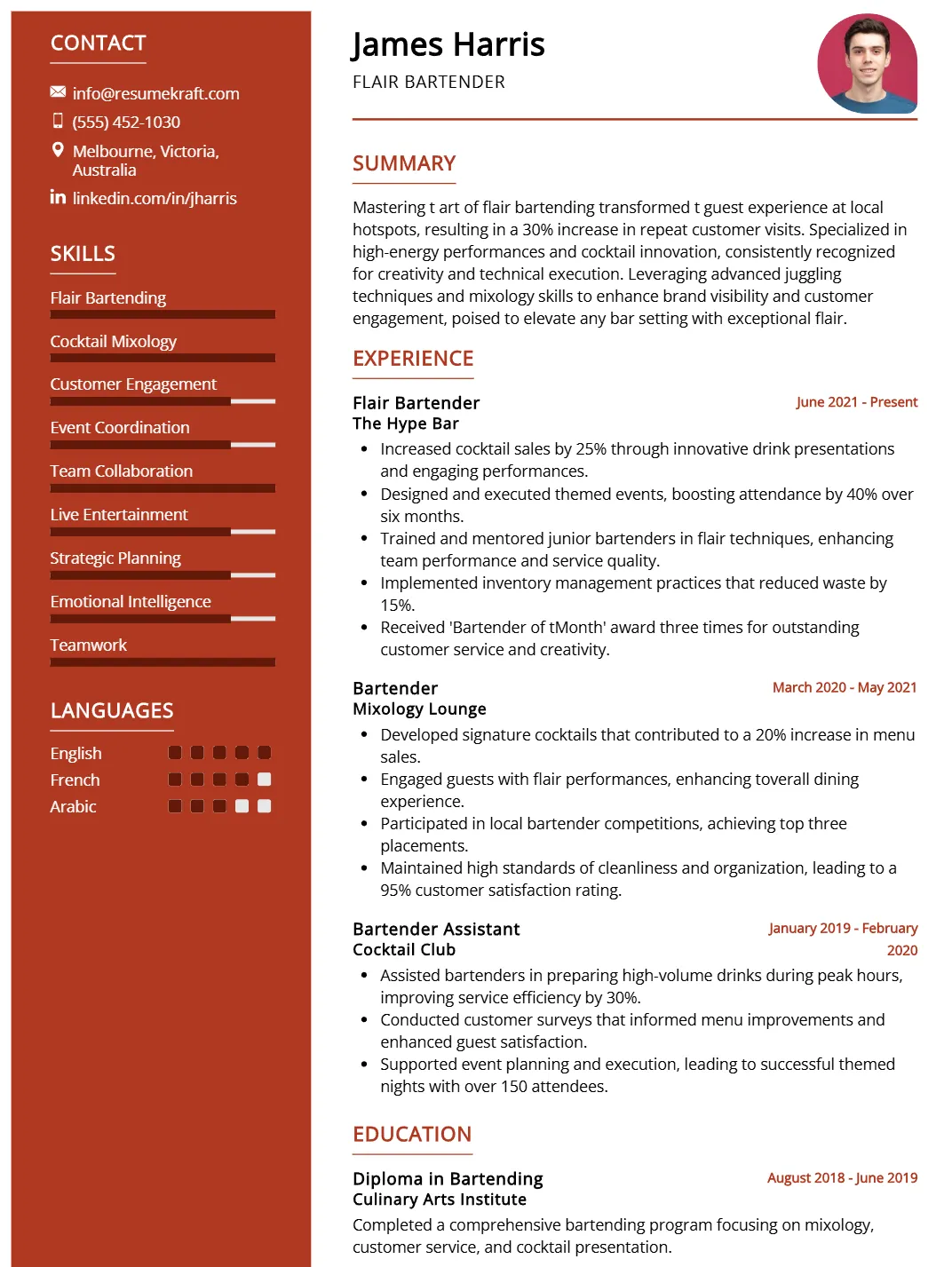
Why This Resume Works
This resume effectively highlights the candidate’s flair bartending expertise and cocktail mixology skills, essential for a Flair Bartender position. With approximately six years of relevant experience, it showcases a robust background in customer engagement and event coordination. The clear format emphasizes key skills and achievements, ensuring easy readability for hiring managers. Additionally, the use of industry-specific keywords enhances ATS compatibility, making it more likely to be noticed. Overall, the strategic presentation aligns with the dynamic nature of flair bartending, appealing directly to potential employers.
Specialty Bartender Resume
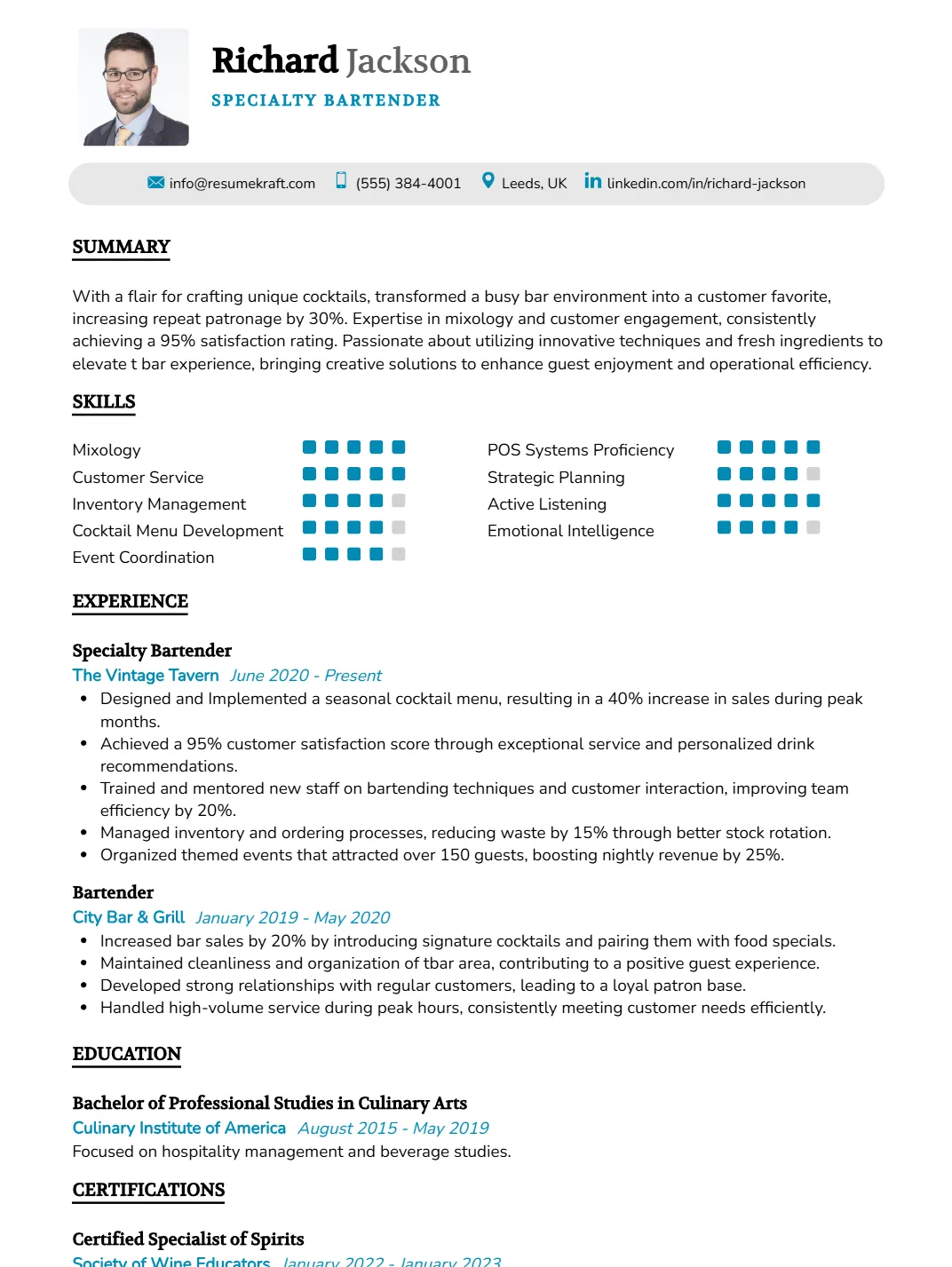
Why This Resume Works
This resume effectively highlights the candidate’s relevant skills and experience for a Specialty Bartender position, showcasing mixology expertise, customer service acumen, and event coordination. The clear format emphasizes key competencies, making it easy for hiring managers to identify qualifications quickly. Its structure is ATS-friendly, incorporating industry-specific keywords that enhance visibility in applicant tracking systems. Additionally, the strategic presentation of achievements, such as successful cocktail menu development and inventory management, demonstrates the candidate’s ability to contribute significantly to a dynamic bartending environment.
Speed Bartender Resume
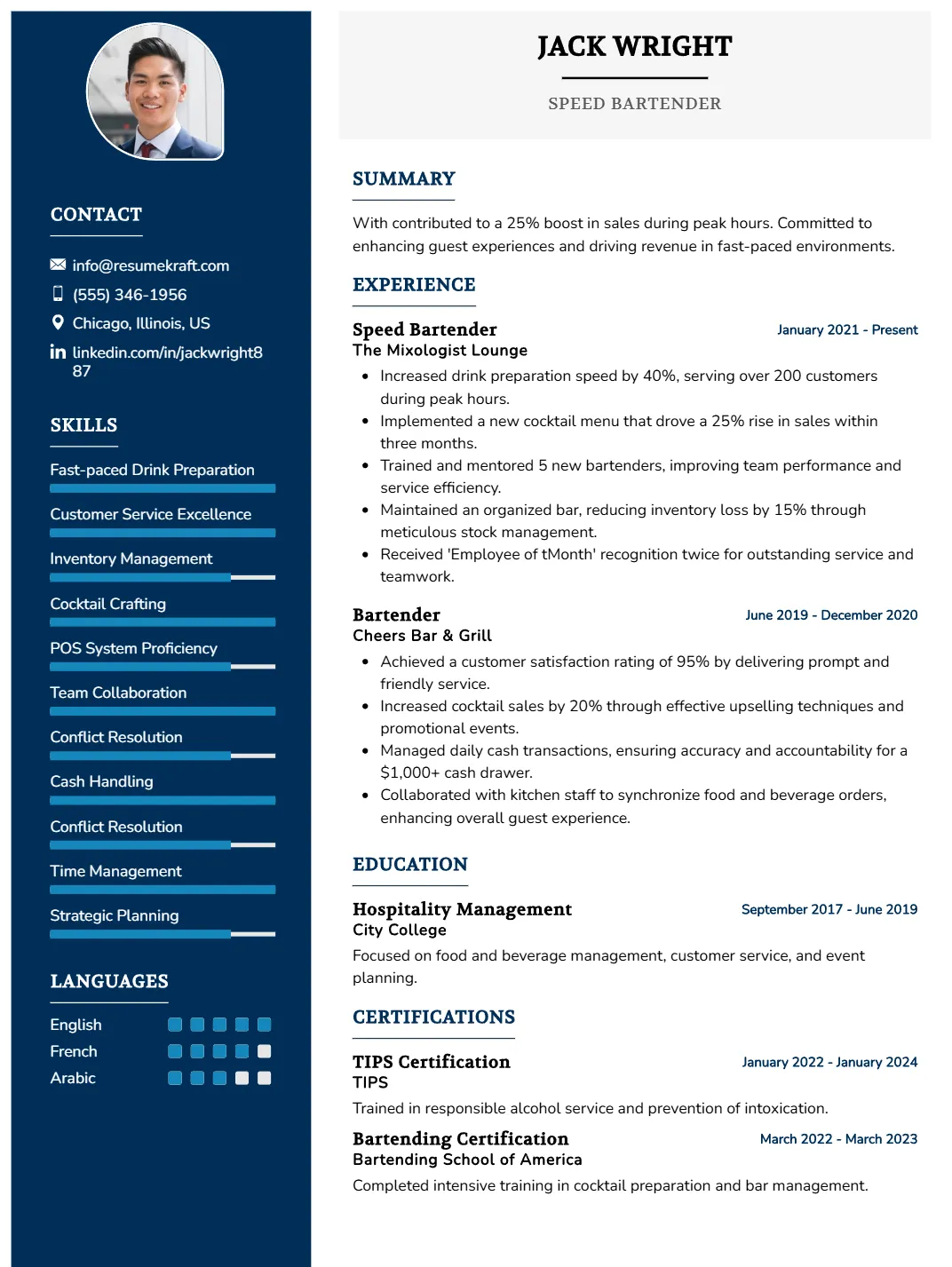
Why This Resume Works
This resume effectively highlights the candidate’s relevant skills and five years of experience as a Speed Bartender, emphasizing fast-paced drink preparation and customer service excellence, which are crucial for this role. Its clear format allows hiring managers to quickly identify key qualifications, while the structured presentation ensures ATS compatibility by incorporating industry-specific keywords. Additionally, showcasing achievements in cocktail crafting and inventory management demonstrates the candidate’s ability to excel in high-pressure environments, making this resume particularly compelling for a Speed Bartender position.
Pub Bartender Resume
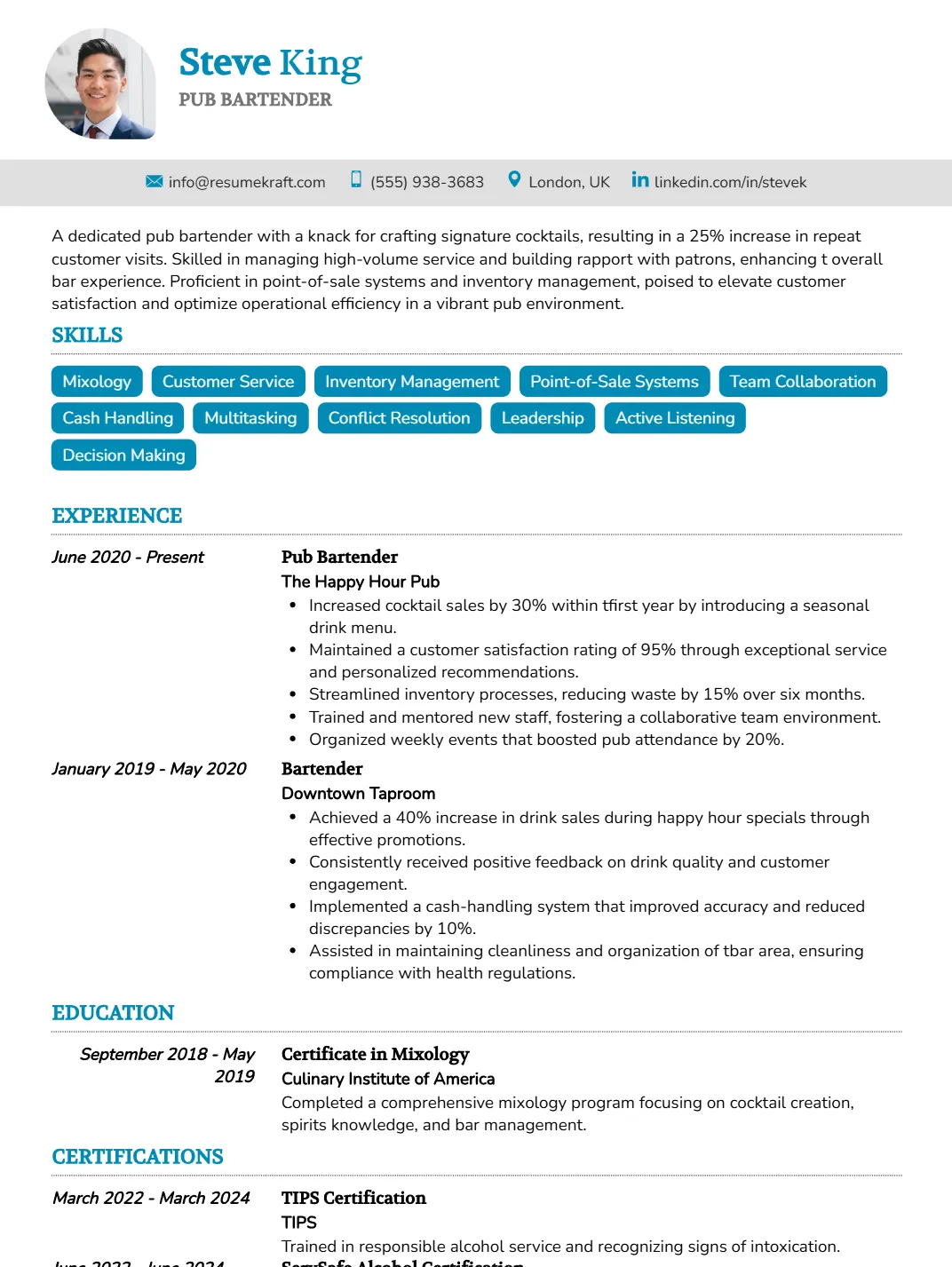
Why This Resume Works
This resume effectively highlights the candidate’s six years of experience as a Pub Bartender, showcasing key skills such as mixology and customer service that are essential for the role. The clear format and structured layout enhance readability, making it easy for hiring managers to identify relevant qualifications quickly. Additionally, the inclusion of industry-specific keywords ensures ATS compatibility, increasing visibility during applicant screening. Strategic presentation of achievements in inventory management and team collaboration further demonstrates the candidate’s capability to excel in a fast-paced pub environment.
Event Bartender Resume
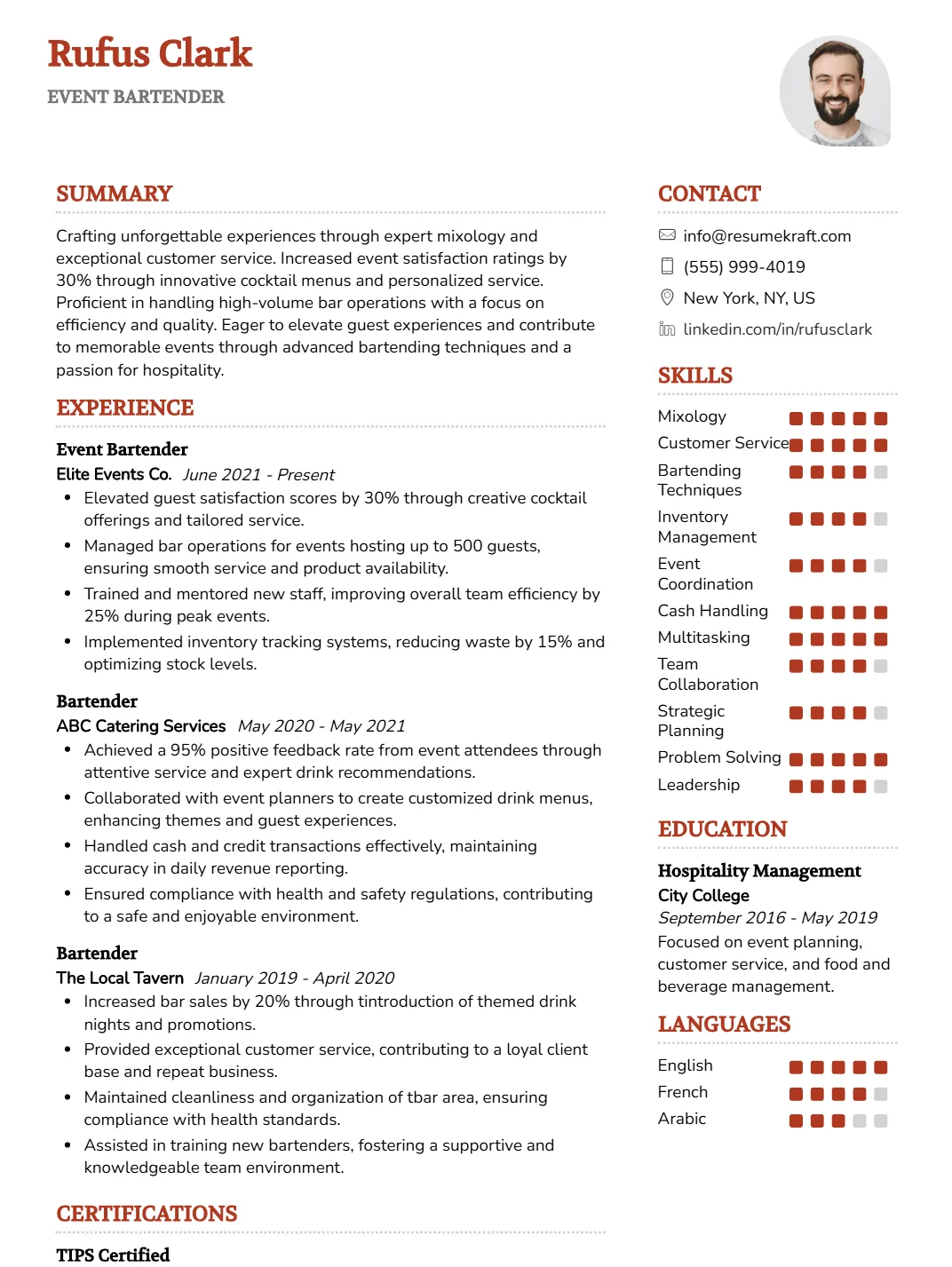
Why This Resume Works
This resume effectively highlights the candidate’s relevant skills and extensive experience as an Event Bartender, showcasing expertise in mixology, customer service, and event coordination. The structured format emphasizes key qualifications while ensuring ATS compatibility through the inclusion of pertinent keywords. Additionally, the strategic presentation of achievements demonstrates a proven track record in bartending techniques and inventory management, making it clear to employers that this candidate is well-equipped to excel in high-pressure event settings.
How to format a Bartender resume
Proper formatting is crucial for a Bartender resume, as it helps convey your skills and experience clearly and professionally. An effective resume format can make a significant difference in catching the attention of hiring managers in the competitive hospitality industry.
- Use a clean and simple layout, avoiding excessive graphics or colors. A well-structured resume increases readability and allows hiring managers to quickly identify key information relevant to the Bartender role.
- Include clear section headings, such as “Experience,” “Skills,” and “Education.” This organization helps to guide the reader through your qualifications and makes it easier for them to find specific details about your background.
- List your work experience in reverse chronological order, starting with your most recent position. This format highlights your current skills and relevant experience, showing potential employers your most recent accomplishments.
- Use bullet points to describe your responsibilities and achievements under each job entry. This concise format allows hiring managers to scan your qualifications quickly and efficiently, ensuring they grasp your key contributions as a Bartender.
- Keep your resume to one page, especially if you have fewer than 10 years of experience. A concise resume format makes it easier for hiring managers to review your credentials without getting overwhelmed by unnecessary details.
How to write your Bartender resume experience
Effectively presenting your work experience on a Bartender resume is essential, as this section showcases your skills, knowledge, and the ability to handle a fast-paced environment. Employers seek candidates who can demonstrate not only their technical bartending skills but also their customer service abilities, teamwork, and reliability under pressure, all of which are critical in the hospitality industry.
When detailing your work experience, focus on quantifiable achievements and specific responsibilities that illustrate your proficiency. Highlighting your ability to mix drinks, manage inventory, and create a welcoming atmosphere can set you apart from other applicants and show potential employers that you are a valuable addition to their team.
Worked as a bartender at a busy bar. Made drinks and served customers.
Bartended at a high-volume bar, serving over 200 customers per shift while creating 10 signature cocktails that increased sales by 20% and received positive feedback on service efficiency and drink quality.
How to list your hard skills and soft skills on your resume
In the competitive field of bartending, a well-rounded resume should showcase both hard and soft skills. Hard skills are the technical proficiencies necessary for crafting drinks, managing inventory, and ensuring customer satisfaction. In contrast, soft skills reflect a bartender’s ability to communicate effectively, handle stress, and create a welcoming atmosphere. Together, these skills not only enhance a bartender’s effectiveness but also contribute to a memorable customer experience, making them essential elements of a strong resume.
Hard Skills:
- Mixology: Expertise in creating cocktails and understanding drink recipes.
- Bar Inventory Management: Ability to track stock levels and order supplies efficiently.
- POS Systems: Proficient in operating point-of-sale systems for transactions.
- Alcohol Knowledge: Understanding of various alcoholic beverages and their characteristics.
- Health and Safety Regulations: Knowledge of hygiene standards and responsible serving practices.
- Customer Service: Skills in addressing customer inquiries and resolving issues.
- Cash Handling: Experience in managing cash transactions accurately.
- Drink Presentation: Knowledge of garnishing and presenting drinks appealingly.
- Event Coordination: Ability to plan and execute bar services for events.
- Bar Equipment Proficiency: Familiarity with tools like shakers, strainers, and blenders.
- Speed and Efficiency: Capability to serve drinks quickly during peak hours.
- Recipe Development: Skills in creating new drink recipes and specials.
- Wine and Beer Pairing: Knowledge of pairing drinks with food for enhanced dining experiences.
- Conflict Resolution: Ability to handle disputes and maintain a positive atmosphere.
- Basic First Aid: Understanding of first aid procedures for health emergencies.
Soft Skills:
- Communication: Strong verbal skills for interacting with customers and staff.
- Teamwork: Ability to collaborate effectively with other bartenders and staff.
- Multitasking: Capability to manage multiple orders and tasks simultaneously.
- Adaptability: Flexibility to adjust to changing customer demands and situations.
- Empathy: Understanding customer needs and providing personalized service.
- Attention to Detail: Precision in making drinks and ensuring customer satisfaction.
- Problem-Solving: Quick thinking to resolve issues that arise during service.
- Time Management: Efficiently managing time to serve customers promptly.
- Stress Management: Maintaining composure in busy or high-pressure environments.
- Creativity: Innovation in developing new cocktails and drink presentations.
- Positive Attitude: Maintaining an upbeat demeanor to enhance the customer experience.
- Listening Skills: Ability to actively listen to customer requests and feedback.
- Dependability: Being reliable and punctual for shifts and responsibilities.
- Sales Skills: Ability to upsell and promote drinks and specials effectively.
- Networking: Skills in building relationships with customers and industry professionals.
- Conflict Management: Skills in de-escalating tense situations and maintaining a peaceful environment.
How to list your certifications and education on your resume
When presenting certifications and education on a Bartender resume, it’s essential to highlight relevant qualifications that demonstrate your expertise in mixology, customer service, and food safety. Include certifications such as bartending school diplomas, responsible beverage service certifications, or any mixology courses completed. If you have a high school diploma or higher education, list these as well, but focus on specialized training that sets you apart in the industry.
Ensure that your certifications are listed clearly, ideally in a separate section titled “Certifications” or “Education.” Mention the name of the certification, the institution where you obtained it, and the date of completion. This structured approach will help hiring managers quickly recognize your qualifications and assess your suitability for the role.
Went to school for bartending and learned how to mix drinks. Also took a few courses on customer service.
Certified Bartender from ABC Bartending School, completed June 2022. Responsible Serving Certification, issued December 2021.
How to write your Bartender resume summary or objective
A strong resume summary or objective is crucial for a Bartender position, as it serves as the first impression for potential employers. A well-crafted summary highlights your relevant experience, skills, and achievements, showcasing your ability to create exceptional customer experiences. In contrast, an objective statement focuses on your career goals and aspirations, often suitable for entry-level positions or when changing careers, emphasizing your eagerness to contribute to the establishment.
Looking for a bartending job where I can improve my skills. I have some experience and want to learn more about drinks.
Dynamic bartender with 3 years of experience in high-volume establishments, skilled in mixology and customer service, seeking to leverage expertise to enhance guest satisfaction at [Bar/Restaurant Name].
Additional sections for a Bartender resume
Including additional sections on a Bartender resume can significantly enhance its appeal by showcasing relevant skills, certifications, and experiences that set you apart from other candidates. These sections provide a more comprehensive view of your qualifications.
- Certifications: Highlighting certifications such as TIPS or ServSafe demonstrates your commitment to responsible service and knowledge of health regulations, which is vital in the hospitality industry.
- Awards and Recognitions: Including any awards or recognitions received for exceptional service or mixology showcases your expertise and dedication, making your application stand out to potential employers.
- Volunteer Experience: Listing volunteer work, especially in events or community service related to food and beverage, shows your passion for the industry and willingness to contribute beyond paid roles.
- Specialty Skills: Mentioning unique skills like flair bartending, wine pairing, or cocktail crafting can catch the eye of employers looking for specific talents that can enhance their establishment’s offerings.
- Language Proficiency: If you speak multiple languages, this is a valuable asset in diverse environments, helping you connect with a broader customer base and improving overall customer service experiences.
Key takeaways for writing a professional Bartender resume
- Highlight relevant bartending experience by detailing specific roles and responsibilities, showcasing your ability to craft cocktails and manage bar operations effectively.
- Use action verbs to convey your achievements clearly, such as “mixed,” “served,” and “managed,” to create a dynamic and engaging resume.
- Consider utilizing resume templates designed for bartenders, which can help you structure your information and present your skills professionally.
- Emphasize customer service skills, as bartenders often interact with patrons; showcase your ability to create a welcoming atmosphere.
- Leverage an ai resume builder to customize your resume, ensuring it aligns with the specific bartending job requirements and stands out to employers.
Frequently Asked Questions
How long should my Bartender resume be?
Your Bartender resume should ideally be one page long. This length is sufficient to highlight your relevant experience, skills, and accomplishments without overwhelming the reader. Focus on concise language and impactful statements that demonstrate your abilities and contributions in previous roles. Being succinct allows you to present a clear snapshot of your qualifications, making it easier for hiring managers to quickly assess your fit for the position.
What is the best format for a Bartender resume?
The best format for a Bartender resume is a chronological format, as it emphasizes your work history and experience in the bar industry. Start with your most recent job and work backward, listing your positions, duties, and achievements. Use clear headings for each section, such as “Experience,” “Skills,” and “Education.” Keep the layout professional and easy to read, using bullet points for responsibilities and achievements to enhance clarity and impact.
What should I highlight on my Bartender resume to stand out?
To stand out, highlight your customer service skills, cocktail knowledge, and ability to work in fast-paced environments. Mention any certifications, such as bartending or mixology courses, and emphasize your ability to create signature cocktails or manage bar inventory. Additionally, showcasing experience in handling cash, managing a team, or training new staff can demonstrate your versatility and leadership qualities, making you a more attractive candidate for bartending positions.
What are some ways to quantify my experience on my Bartender resume?
Quantifying your experience can significantly enhance your resume’s impact. Include specific figures, such as the number of drinks served per shift, the volume of sales you contributed to, or the size of events you managed. For example, you might state, “Served an average of 200 customers per night, leading to a 15% increase in sales during peak hours.” These metrics provide tangible evidence of your capabilities and achievements, making your resume more compelling.

